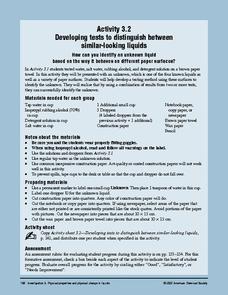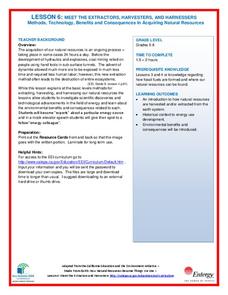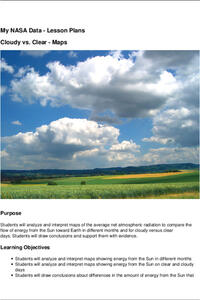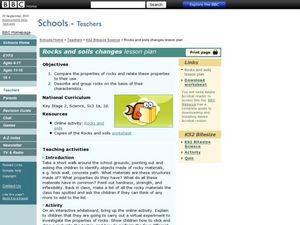American Chemical Society
Developing Tests to Distinguish Between Similar-Looking Liquids
Each group talks about how to test unknown liquids based on their findings in the previous experiment. In this second of four activities, they test unknowns on wax paper, newspaper, and construction paper. As a stand-alone, this lesson...
Cheetah Outreach
Life Cycles
How does a cheetah life cycle differ from a human life cycle? Kids graph weight gain for humans versus cheetahs and compare other life cycle events such as gestation and life span
Polar Trec
Rings of Life
Individuals analyze tree rings to determine the health of an ecosystem. They then look at otoliths of fish, hard calcium carbonate structures located behind the brain, in the same manner.
Messenger Education
Exploring Exploring
The reason people first began trading was because of their desires for objects other societies possessed. In the activity, classes discuss why exploration has been a common thread in all societies and where these desires have taken...
Chicago Botanic Garden
Climate Change Around the World
Look at climate change around the world using graphical representations and a hands-on learning simulation specified to particular cities around the world. Using an interactive website, young scientists follow the provided directions to...
National Wildlife Federation
Lights, Camera, Action! Conducting an Energy Audit
Thirty percent of energy used by schools is used inefficiently! Part two in the series of 12 has groups perform energy audits of their schools as part of the Cool Schools Challenge. Each group is assigned a specific room, performs the...
National Wildlife Federation
Meet the Extractors, Harvesters, and Harnessers: Methods, Technology, Benefits and Consequences in Acquiring Natural Resources
There are advantages and disadvantages to all sources of energy; the trick is determining which one has the least impact! Part six in the series of 12 has learners further explore energy resources. After reading information about one of...
National Wildlife Federation
It's All in the Name: Weather Versus Climate
What goes up when rain comes down? An umbrella! Activity eight in the series of 12 explores weather and climate. In pairs, participants analyze maps, watch a short video, create a weather forecast, and complete a reading to determine the...
NASA
Christa's Lost Lesson: Effervescence
How are chemical reactions affected by gravity? Learners explore the phenomenon of effervescence as part of the Christa's Lost Lessons series. They compare findings in an experiment on effervescence to a video of a similar experiment in...
Bonneville
Solar Powered Calculator
The perfect place to do one's math homework? Outside, of course. The third of seven lessons in the Understanding Science and Engineering unit focuses on solar energy. Learners investigate solar-powered calculators and discover how solar...
NASA
Cloudy vs. Clear - Maps
Find out the science of how clouds keep Earth cooler on hot days. Using guided discussions, investigators analyze and interpret maps of how much solar energy Earth receives at different times of the year. Participants draw conclusions...
Curated OER
Working with Questions
Students explore questions in a scientific context. They consider what makes questions testable. After reading short scenarios, students come up with their own testable questions about the reading.
Curated OER
Fast Cars and Roll-Over
Students creat a ramp using cardboard and tape. They follow directions to perform an experiment to determine the degree of tilt needed to cause an empty milk carton to tip over. Students discuss their results in terms of center of gravity.
Curated OER
Plants Need Soil
Third graders identify what plants need to grow. In this agricultural lesson, 3rd graders read the book The Empty Pot and discuss the steps to take when planting a seed. Students plant a seed and water it each day. Students discuss their...
Curated OER
Introduction to the Scientific Method
Students participate in an experiment and learn to record it using the scientific method. For this biodegradable plastics lesson, students follow the scientific method to complete an inquiry. Students complete an experiment with a fish...
Curated OER
Introduction to the Scientific Method
Students recognize and follow the steps of the scientific method to complete an experiment. In this scientific method activity, students use inquiry tools to measure objects. Students record their data.
Curated OER
Ocean Habitats
Students examine the water samples from a demonstration and discuss the difference between fresh and salt water. They draw different animals that live near or in the ocean and how humans can harm the ocean habitat. They draw pictures of...
Curated OER
Dirty Decomposers
Students explore the ecosystem by conducting a ziploc bag experiment. In this recycling lesson, students identify decomposer organisms in our environment and how they speed up the recycling process. Students utilize a ziploc plastic bag,...
Curated OER
Food Webs
Learners identify predator/prey relationships based on the food web of the tropical rain forest ecosystem and realize they need a food web for survival. In this food web lesson plan, students complete a role play activity being animals...
Curated OER
DIY Lava Lamp
Students examine lava lamps and what causes them to work. For this density lesson students make a lava lamp and write the scientific explanation of what happens.
Curated OER
Uses of Water
Students plan for a water shortage in their area. In this water lesson plan, students analyze water usage and plan and share a reduction plan. Groups share their results and calculate the averages. Students analyze how water is...
Curated OER
Rocks and Soil Changes lesson plan
Students recognize objects around their school made of rocky materials. In this changes in rocks and soil lesson, students use a website for a virtual experiment of rocks. Students group rocks based on their properties. Students...
Curated OER
Changing State
Learners examine the changing states of water. In this solid, liquid, gas lesson, students discover that water changes when heated or cooled. Learners make predictions and then use the interactive whiteboard to "heat and cool" the water...
Curated OER
Keeping Warm
Students experiment with thermal insulators. In this heat transfer lesson, students predict and then measure heat loss from a cup of water using different materials as insulators. Students complete a line graph to display their results.

























